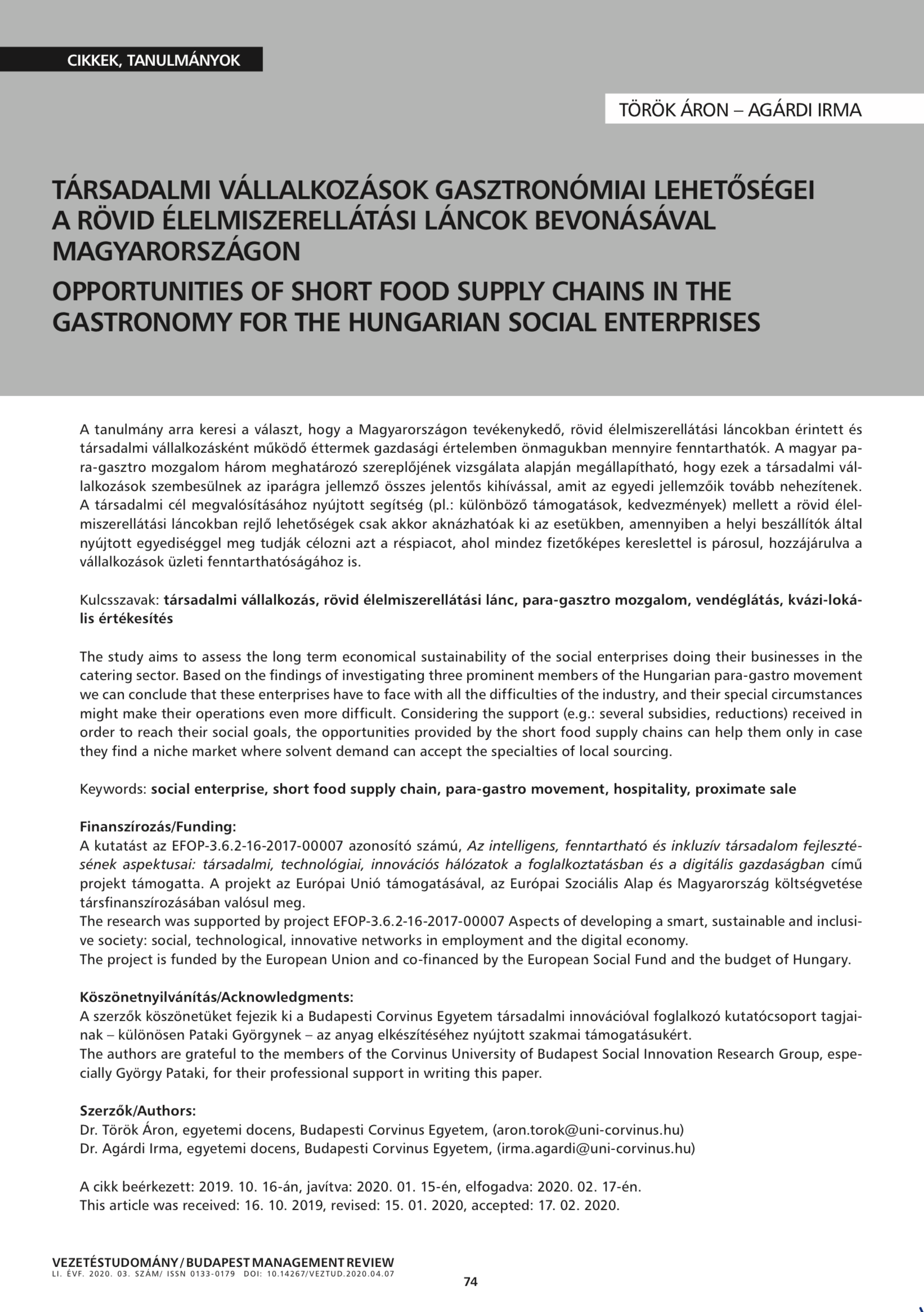Társadalmi vállalkozások gasztronómiai lehetőségei a rövid élelmiszerellátási láncok bevonásával Magyarországon
DOI:
https://doi.org/10.14267/VEZTUD.2020.04.07Kulcsszavak:
társadalmi vállalkozás, rövid élelmiszerellátási lánc, para-gasztro mozgalom, vendéglátás, kvázi-lokális értékesítésAbsztrakt
A tanulmány arra keresi a választ, hogy a Magyarországon tevékenykedő, rövid élelmiszerellátási láncokban érintett és társadalmi vállalkozásként működő éttermek gazdasági értelemben önmagukban mennyire fenntarthatók. A magyar para- gasztro mozgalom három meghatározó szereplőjének vizsgálata alapján megállapítható, hogy ezek a társadalmi vállalkozások szembesülnek az iparágra jellemző összes jelentős kihívással, amit az egyedi jellemzőik tovább nehezítenek. A társadalmi cél megvalósításához nyújtott segítség (pl.: különböző támogatások, kedvezmények) mellett a rövid élelmiszerellátási láncokban rejlő lehetőségek csak akkor aknázhatóak ki az esetükben, amennyiben a helyi beszállítók által nyújtott egyediséggel meg tudják célozni azt a réspiacot, ahol mindez fizetőképes kereslettel is párosul, hozzájárulva a vállalkozások üzleti fenntarthatóságához is.
Letöltések
Hivatkozások
Benedek, Z. (2014). A rövid ellátási láncok hatásai. Budapest: MTA KRTK Közgazdaság-tudományi Intézet.
Craven, T., & Krejci, C. C. (2016). Assessing management strategies for intermediated regional food supply networks. Paper presented at the 2016 International Annual Conference of the American Society for Engineering Management, ASEM 2016.
Csillag, S., Toarniczky, A., & Primecz, H. (2018). Dolgoznánk, ha hagynátok... Megváltozott munkaképességű emberek és a HR-rendszerek. Vezetéstudomány/Budapest Management Review, 49(6), 33-45. http://dx.doi.org/10.14267/veztud.2018.06.04
Dickerson, C., & Hassanien, A. (2017). Restaurants’ social enterprise business model: Three case studies. Journal of Quality Assurance in Hospitality & Tourism, 19(2), 192-216. https://doi.org/10.1080/1528008x.2017.1363009
Európai Bizottság. (2011). Az Európai Bizottság közleménye az Európai Parlamentnek, a Tanácsnak, az Európai Gazdasági és Szociális Bizottságnak és a Régiók Bizottságának. Kezdeményezés a szociális vállalkozásért. A szociális vállalkozásokat mint a szociális gazdaság és innováció kulcsszereplőit előmozdító szabályozási légkör kialakítása.
Fleury, P., Lev, L., Brives, H., Chazoule, C., & Désolé, M. (2016). Developing mid-tier supply chains (France) and values-based food supply chains (USA): A comparison of motivations, achievements, barriers and limitations. Agriculture (Switzerland), 6(3). https:// doi.org/10.3390/agriculture6030036
G. Fekete, É., Bereczk, Á., Kádárné Horváth, Á., Kiss, J.,Péter, Z., Siposné Nándori, E., & Szegedi, K. (2017). Alapkutatás a társadalmi vállalkozások működéséről.Zárótanulmány az OFA Országos Foglalkoztatási Közhasznú Nonprofit Kft. megbízásából, a GINOP-5.1.2-15-2016-00001 „PiacTárs” kiemeltprojekt keretében.
Givens, G., & Dunning, R. (2018). Distributor intermediation in the farm to food service value chain. Renewable Agriculture and Food Systems, 1-3. https://doi.org/10.1017/S1742170517000746
Grassl, W. (2012). Business models of social enterprise:A design approach to hybridity. Journal of Entrepreneurship Perspectives, 1(1), 37-60.
Győri, Z., & Csillag, S. (2019a). Vállalati felelősségvállalás és fogyatékossággal élő személyek foglalkoztatása: külön múlt – közös jövő? 1. rész: A kapcsolódó politikák fejlődése az EU-ban és Magyarországon. Vezetéstudomány/Budapest Management Review, 50(6), 14-23. https://doi.org/10.14267/veztud.2019.06.02
Győri, Z., & Csillag, S. (2019b). Vállalati felelősségvállalás és fogyatékossággal élő személyek foglalkoztatása: külön múlt – közös jövő? – 2. rész: A fogyatékossággal élő személyek foglalkoztatása a CSR-szakirodalomban és a gyakorlatban. Vezetéstudomány/Budapest Management Review, 50(7-8), 1 6-30. https://doi.org/10.14267/veztud.2019.07.02
Igazságügyi Minisztérium. (2019). Céginformációs és az Elektronikus Cégeljárásban Közreműködő Szolgálat. Retrieved from https://e-beszamolo.im.gov.hu/oldal/kezdolap
Inwood, S. M., Sharp, J. S., Moore, R. H., & Stinner, D. H. (2008). Restaurants, chefs and local foods: insights drawn from application of a diffusion of innovation framework. Agriculture and Human Values, 26(3), 177-191. https://doi.org/10.1007/s10460-008-9165-6
Jakubinyi, L. (2017). "Konyhatitkok" Para-gasztro mozgalom Magyarországon. Miskolc: Szimbiózis Alapítvány.
Kajner, P., & Jakubinyi, L. (2015). Szociális farmok létrehozása Magyarországon. Letöltve: http://szocialisfar m.hu /f iles/Szocialis%20Far m%20tanulmany%203.2.%20vegleges_nokorr.pdf
Kocziszky, G., Veresné Somosi, M., & Balaton, K. (2017). A társadalmi innováció vizsgálatának tapasztalatai és fejlesztési lehetőségei. Vezetéstudomány/Budapest Management Review, 48(6-7), 15-19. https://doi.org/10.14267/veztud.2017.06.02
Laville, J.-L., & Nyssens, M. (2001). The social enterprise. In Borzaga, C. & Defourney, J. (Eds.), The emergence of social enterprise (pp. 312-332). London: ROUTLEDGE in association with GSE Research.
Lukjanska, R. (2015). How to choose proper business model for social enterprise. Retrieved from http://socialinnovation.lv/wp-content/uploads/2015/07/Business-model-webam-small.pdf
Malak-Rawlikowska, A., Majewski, E., Wąs, A., Borgen, S. O., Csillag, P., Donati, M., . . . Wavresky, P. (2019). Measuring the Economic, Environmental, and Social Sustainability of Short Food Supply Chains. Sustainability, 11(15), 4004. httpd://doi.org/10.3390/su11154004
Malota, E., Gyulavári, T., & Bogáromi, E. (2019). „Az vagy, amit megeszel” - a hazai fogyasztók egészséges táplálkozással kapcsolatos percepciói és attitűdjei. Vezetéstudomány/Budapest Management Review, 50(1), 80-88. https://doi.org/10.14267/veztud.2019.01.08
Marsden, T., Banks, J., & Bristow, G. (2000). Food supply chain approaches: Exploring their role in rural development. Sociologia Ruralis, 40(4), 424-438. https://doi.org/10.1111/1467-9523.00158
Moulaert, F., Mehmood, A., MacCallum, D., & Leubolt, B. (2017). Social innovation as a trigger for transformations-the role of research. Luxembourg: Publications Office of the European Union.
Mulgan, G., Tucker, S., Ali, R., & Sanders, B. (2007). Social innovation: what it is, why it matters and how it can be accelerated. Retrieved from http://eureka.sbs.ox.ac.uk/761/1/Social_Innovation.pdf
Nyssens, M. (2014). Innovation sociale et entreprise sociale: quels dialogues possibles? Paper presented at the L'innovation sociale, un levier de développement régional UNIPSO. In: Christian Jetté, Juan-Luis Klein & Matthieu Roy (Eds.), La transformation sociale pas l'innovation sociale. Presses de l'Université du Québec: Québec.
Primecz, H., Kiss, J., & Toarniczky, A. (2019). Diverzitáskategóriák és társadalmi vállalkozások: Nemzetközi kitekintés. Vezetéstudomány/Budapest Management Review, 50(10), 61-73. https://doi.org/10.14267/veztud.2019.10.06
Renting, H., Marsden, T. K., & Banks, J. (2003). Understanding alternative food networks: Exploring the role of short food supply chains in rural development. Environment and Planning A, 35(3), 393-411. https://doi.org/10.1068/a3510
Repisky, M., & Tóth, J. (2019). Mi motivál egy társadalmi vállalkozót? – Egy feltáró kvalitatív kutatás eredményei. Vezetéstudomány/Budapest Management Review, 50(3), 11-24. https://doi.org/10.14267/veztud.2019.03.02
Sonnino, R., & Marsden, T. (2006). Beyond the divide: Rethinking relationships between alternative and conventional food networks in Europe. Journal of Economic Geography, 6(2), 181-199. https://doi.org/10.1093/jeg/lbi006
Starr, A., Card, A., Benepe, C., Auld, G., Lamm, D., Smith, K., & Wilken, K. (2003). Sustaining local agriculture: Barriers and opportunities to direct marketing between farms and restaurants in Colorado. Agriculture and Human Values, 20(3), 301-321. https://doi.org/10.1023/A:1026169122326
Vittersø, G., Torjusen, H., Laitala, K., Tocco, B., Biasini, B., Csillag, P., . . . Wavresky, P. (2019). Short Food Supply Chains and Their Contributions to Sustainability: Participants’ Views and Perceptions from 12 European Cases. Sustainability, 11(17), 4800. https://doi.org/10.3390/su11174800

Downloads
Megjelent
Hogyan kell idézni
Folyóirat szám
Rovat
License
Authors assign copyright to Vezetéstudomány / Budapest Management Review. Authors are responsible for permission to reproduce copyright material from other sources.

